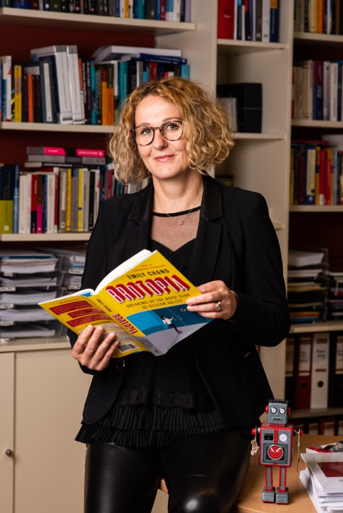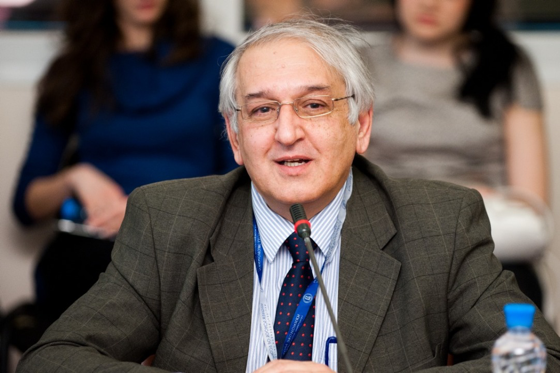Sabine T. Koeszegi
Is Human Autonomy Endangered by Algorithmic Decision Support?
Abstract: Artificial Intelligence (AI) is considered to be a transformative force that is bound to fundamentally change our professional, private, and social lives. AI systems support physicians in diagnosing diseases, they help judges to set bails, they suggest potential candidates to be hired to recruiters, and instead of bank clerks, AI systems decide whether or not a customer is granted a loan. Furthermore, our personal AI assistants on our smartphones and in our homes recommend – based on automatically learned preferences – suitable products and services, songs, and even potential love and sex partners. Algorithms decide which news we see in our personal news feeds, and often – without being aware – we are nudged and herded into certain behaviors rather than others by these systems. These new applications of algorithmic decision making blur the boundaries between automated decisions and decision support. As prediction machines, data-driven AI systems have the capacity to produce accurate and reliable classifications and forecasts reducing uncertainty and complexity of decision problems. With the help of algorithms, decisions should become more objective, efficient, faster and fairer. But the transfer of decision making to autonomous systems comes at the cost of transparency and human autonomy without necessarily avoiding human biases. System robustness, transparency and explainability of AI systems are key for safeguarding fundamental human rights such as human autonomy. In my talk I will address social, societal and ethical challenges associated with the application of black box algorithms in decision support and discuss requirements for an ethically aligned system design.
Short Bio: Sabine T. Koeszegi is Full Professor of Labor Science and Organization at the TU Wien and Academic Director of the MBA Program Entrepreneurship and Innovation. She received her PhD in Social Sciences from the University of Vienna. Her research focus is in the intersection of work, technology and organization. Sabine Koeszegi is a member of the European Academy of Sciences and Arts. Since 2017 she is chair of the Austrian Council on Robotics and Artificial Intelligence. As a member of the High-level Expert Group on Artificial Intelligence of the European Commission, she has co-authored the European Ethics Guidelines for Trustworthy AI published in 2019.

Fuad Aleskerov
Network analysis of international conflicts
Abstract: Network analysis has become one of the powerful instruments in studies of social phenomena. One of the main components of network analysis consists in the analysis of most influential elements in the network made using so-called centrality indices. However, classic centrality indices do not take into account several important features of elements’ interactions such as parameters of vertices in a network, an influence of group of vertices to one vertex, the fixed length of influence of one vertex to another one. We propose a family of new indices taking into account all these features, and use them in the analysis of international conflicts from 1946 to 2017. One of the specific features of this work is that we include in this analysis internal conflicts which sometimes have crucial influence to the intensity of international conflicts, and we study the stability of these networks using new stability measures.
Short Bio: Fuad Aleskerov is head of the Department of Mathematics for Economics and the International Center for Decision Analysis and Choice of the National Research University Higher School in Economics and head of the Laboratory of Choice Theory and Decision Analysis of the Russian Academy of Sciences in Moscow. His main research interests are in the fields of decision analysis, social choice and game theory. He has published 10 books and more than 100 peer reviewed papers and received various national and international awards for his research. He is a member of the Academia Europaea, the American Mathematical Society and many other scientific societies.

Dawn Parker
Developing Complex Spatial, Temporal, Behavioural, and Institutional Models to Assist Policy Assessment, Design, and Negotiation for Adoption of Green Infrastructure on Private Yards
Abstract: It is increasingly recognized, as highlighted by the international Global Land Programme, that land-use, land-cover, and global environmental change are directly intertwined. Further, land-use and land-cover systems are recognized as complex, characterized by spatial, temporal, behavioural, and institutional complexity, all linked through potentially indirect cross-scale feedbacks. Supported by examples from my research groups, I will present evolving work on linkages between residential yard management, green infrastructure, and off-site environmental impacts. For regulators and policy makers at multiple scales, private green infrastructure presents a complex regulatory challenge. While most urban area open space consists of private yards, inducing adoption of private green infrastructure is challenging, as benefits of adoption of green infrastructure measures are public, but the often considerable costs are private. Early collaborative research in the Potomac River watershed (Albert 2007) approached this problem from a land-cover and spatial complexity perspective, showing that even uniform adoption of best management practices on private yards would not achieve water quality targets. More recent research from the Michigan Sluce2 project on the closely related topic of yard management and carbon sequestration) highlighted temporal and behavioural complexity, demonstrating how social norms and neighbour imitation influence the evolution of local spatial patterns of yard management (Nassauer et al. 2014; Huang, Robinson, and Parker 2014). Developing work on green infrastructure adoption decisions in private yards in Kitchener-Waterloo, Ontario adds an institutional complexity component to our research scope, specifically examining the role of “bridging organizations,” such as non-profits, as mediators between local governments and individual decision-makers. I will discuss our plans to conduct participatory agent-based modelling involving residents, non-profit, government, and expert participants, with the goal of identifying feasible and acceptable policies to encourage green infrastructure adoption on private yards.
Short Bio: Dawn Parker is a Professor in the School of Planning, Faculty of Environment, University of Waterloo, Canada. She has been actively involved in the development of the Waterloo Institute for Complexity & Innovation, serving previously as Associate Director and Director, and most recently leading efforts to develop a Canadian Network for Complex Systems. Her research focuses on the development of fine-scale models that link the drivers of land-use change and their socioeconomic and ecological impacts, with completed and ongoing projects on organic agriculture in California’s Central Valley, timber harvest and carbon sequestration in eastern deciduous forests in West Virginia, U.S.A., the effects of HIV/AIDS on smallholder agricultural households in Uganda. Her most recent work focuses on residential landscapes, examining interactions between land markets, landscaping, and carbon sequestration in ex-urban landscapes, and modelling the co-evolution of urban transit networks and residential neighbourhoods via land and housing markets. Her areas of technical expertise include agent-based modelling, land-use and property market modelling, and environmental and resource economics.
She received her BA in economics from Lewis and Clark College and her PhD in agricultural and resource economics from University of California – Davis. She then completed a post-doctoral fellowship in modelling with Elinor Ostrom at Indiana University. Previously to joining UW, she was a founding member of the Center for Social Complexity and Department of Computational Social Science at George Mason University, U.S.A., where she served as director for the PhD program in computational social science. She is a fellow of the Global Land Project, serves on the editorial board Socio-Environmental Systems Modelling and on the advisory board of the Network for Computational Modeling in Social and Ecological Sciences.

